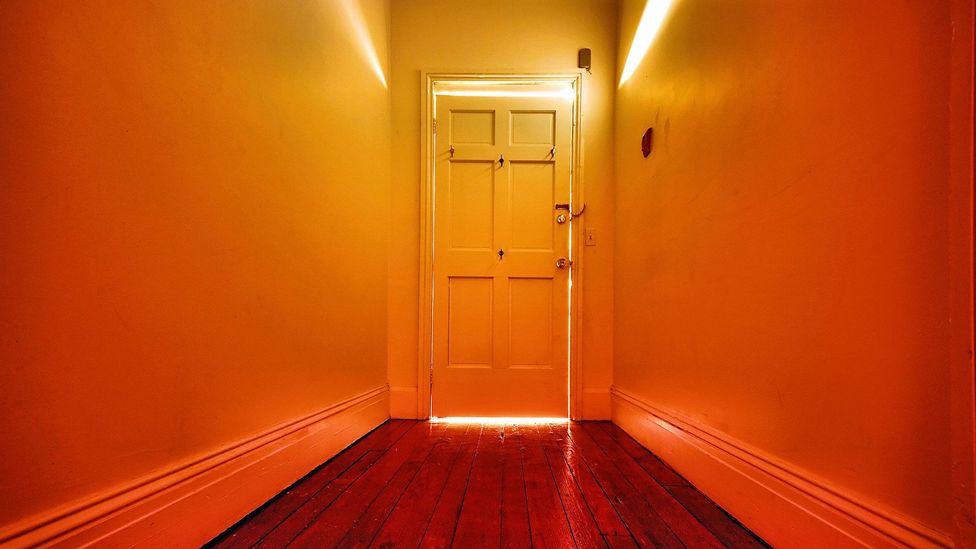So This Is How Cause Us to Forget Again
Why does walking through doorways make us forget?
(Image credit:
Getty Images
)

Forgetting why you entered a room is called the "Doorway Effect", and it may reveal equally much well-nigh the strengths of man retentivity, every bit it does the weaknesses, says psychologist Tom Stafford.
W
We've all done it. Run upstairs to become your keys, but forget that it is them you're looking for one time you lot get to the bedroom. Open the fridge door and attain for the middle shelf but to realise that nosotros can't remember why we opened the fridge in the showtime place. Or wait for a moment to interrupt a friend to discover that the burning event that made united states want to interrupt has now vanished from our minds just every bit nosotros come to speak: "What did I desire to say again?" we ask a confused audience, who all think "how should we know?!"
Although these errors can be embarrassing, they are as well mutual. It's known as the "Doorway Effect", and it reveals some important features of how our minds are organised. Agreement this might help us appreciate those temporary moments of forgetfulness as more than just an annoyance (although they will still be annoying).
These features of our minds are maybe best illustrated by a story about a adult female who meets three builders on their lunch break. "What are you doing today?" she asks the first. "I'm putting brick after sodding brick on summit of some other," sighs the first. "What are you doing today?" she asks the second. "I'm building a wall," is the simple respond. But the tertiary architect swells with pride when asked, and replies: "I'm building a cathedral!"

By the fourth dimension yous've reached the refrigerator, you have forgotten why you were at that place - but rather than being a weakness, this may reflect circuitous brain processing (Credit: Getty Images)
Mayhap you heard that story as encouragement to retrieve of the big flick, but to the psychologist in y'all the important moral is that any action has to be thought of at multiple levels if you are going to acquit it out successfully. The third builder might have the well-nigh inspiring view of their day-job, but nobody can build a cathedral without figuring out how to successfully put one brick on height of some other similar the commencement architect.
As we move through our days our attention shifts between these levels – from our goals and ambitions, to plans and strategies, and to the lowest levels, our concrete actions. When things are going well, often in familiar situations, nosotros go on our attending on what nosotros want and how we do it seems to take care of itself. If you're a skilled driver then you lot manage the gears, indicators and wheel automatically, and your attending is probably caught upwards in the less routine business of navigating the traffic or talking to your passengers. When things are less routine we have to shift our attention to the details of what nosotros're doing, taking our minds off the bigger flick for a moment. Hence the pause in conversation every bit the driver gets to a catchy junction, or the engine starts to make a funny sound.
The mode our attending moves up and downwardly the hierarchy of action is what allows us to conduct out complex behaviours, stitching together a coherent plan over multiple moments, in multiple places or requiring multiple deportment.
The Doorway Issue occurs when our attention moves between levels, and it reflects the reliance of our memories – even memories for what nosotros were about to do – on the surroundings we're in.

Our brain organises our goals into a hierarchy of actions - but fifty-fifty the simple human activity of walking through a door may cause us to lose track of our plans (Credit: Getty Images)
Imagine that we're going upstairs to get our keys and forget that it is the keys nosotros came for as soon as we enter the bedroom. Psychologically, what has happened is that the plan ("Keys!") has been forgotten fifty-fifty in the middle of implementing a necessary part of the strategy ("Go to bedroom!"). Probably the plan itself is function of a larger plan ("Become prepare to leave the house!"), which is part of plans on a wider and wider scale ("Get to work!", "Continue my task!", "Be a productive and responsible denizen", or any). Each scale requires attention at some point. Somewhere in navigating this complex bureaucracy the need for keys popped into heed, and like a circus performer setting plates spinning on poles, your attention focussed on information technology long plenty to construct a plan, but and then moved on to the side by side plate (this time, either walking to the bedroom, or wondering who left their dress on the stairs over again, or what yous're going to do when you get to work or one of a one thousand thousand other things that it takes to build a life).
And sometimes spinning plates fall. Our memories, even for our goals, are embedded in webs of associations. That tin exist the physical environment in which nosotros form them, which is why revisiting our babyhood abode can bring back a flood of previously forgotten memories, or it can be the mental environment – the gear up of things we were just thinking about when that thing popped into mind.
The Doorway Result occurs because we modify both the physical and mental environments, moving to a different room and thinking most different things. That hastily thought upwardly goal, which was probably just i plate among the many we're trying to spin, gets forgotten when the context changes.
It's a window into how we manage to coordinate complex actions, matching plans with actions in a way that – well-nigh of the time – allows us to put the right bricks in the right identify to build the cathedral of our lives.
If you lot take an everyday psychological phenomenon you'd like to see written well-nigh in these columns please get in touch with @tomstafford on Twitter, or ideas@idiolect.org.united kingdom.
Join 500,000+ Future fans past liking us on Facebook , or follow us on Twitter , Google+ , LinkedIn and Instagram .
If you liked this story, sign up for the weekly bbc.com features newsletter , called "If You Only Read vi Things This Calendar week". A handpicked selection of stories from BBC Future, World, Culture, Capital, Travel and Autos, delivered to your inbox every Friday.
delacruzfitain1956.blogspot.com
Source: https://www.bbc.com/future/article/20160307-why-does-walking-through-doorways-make-us-forget
0 Response to "So This Is How Cause Us to Forget Again"
Post a Comment